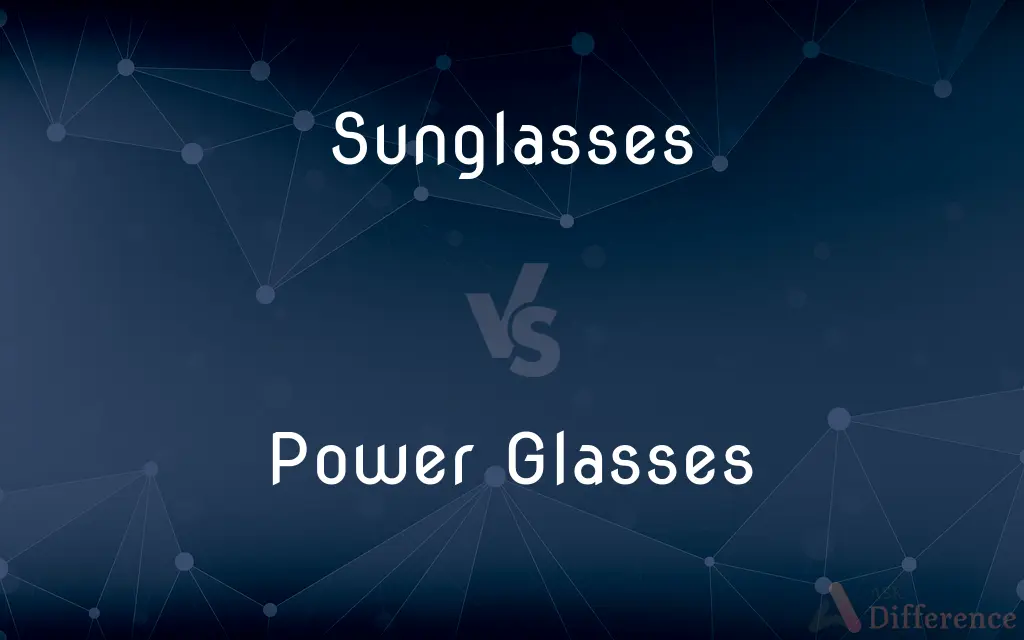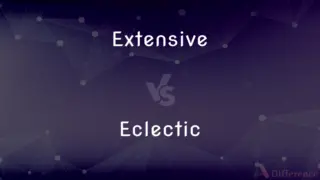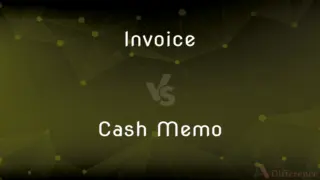Sunglasses vs. Power Glasses — What's the Difference?
Edited by Tayyaba Rehman — By Fiza Rafique — Published on November 23, 2023
Sunglasses are darkened or polarized glasses shielding eyes from light, while Power Glasses are corrective lenses designed to enhance visual acuity.

Difference Between Sunglasses and Power Glasses
Table of Contents
ADVERTISEMENT
Key Differences
Sunglasses, inherently, are designed to protect eyes from glaring and potentially harmful light. In contrast, Power Glasses, irrespective of light conditions, are tailored to correct and enhance the wearer's vision, aligning it to optimal clarity and focus.
Sunglasses typically boast tinted lenses, which serve the primary function of mitigating bright light and minimizing UV exposure. Alternatively, Power Glasses serve a primarily corrective purpose, employing lenses that are specially designed to address and compensate for vision impairments like myopia or hypermetropia.
Sunglasses might be utilized in various light conditions but predominantly find their use under bright or glaring light scenarios. Power Glasses, however, find consistent usage across varied environments, serving as a necessary tool for individuals to experience clear vision, irrespective of light conditions.
Sunglasses often come in various styles, tints, and forms, offering aesthetic choices alongside their protective functionality. Power Glasses too can be stylistically diverse but are ultimately shaped by the need to cater to the wearer's specific vision correction requirements, such as bifocal or multifocal lenses.
Sunglasses, while providing a necessary shield against light, do not correct vision. Power Glasses, on the other hand, do not inherently offer protection against bright light or UV rays unless they are specifically treated or tinted to do so.
ADVERTISEMENT
Comparison Chart
Primary Function
Protect eyes from bright light
Correct vision
Lens Characteristics
Tinted or polarized
Tailored to individual’s eye power
Usage Condition
Predominantly in bright light
Across all light conditions
Visual Correction
Do not provide visual correction
Provide specific visual correction
UV Protection
Generally provide UV protection
May not provide UV protection
Compare with Definitions
Sunglasses
Often have tinted or polarized lenses.
Her sunglasses had a stylish tint that also reduced glare.
Power Glasses
Essential for those with vision impairments.
He can’t read the board without his power glasses.
Sunglasses
Protect eyes from ultraviolet rays.
It's important to wear sunglasses outdoors to shield your eyes from UV rays.
Power Glasses
Can be bifocal, multifocal, or single-vision lenses.
She chose bifocal power glasses to assist with reading and distance vision.
Sunglasses
Are wearable in varied light conditions.
She donned her sunglasses even though it was somewhat cloudy.
Power Glasses
Corrective lenses tailored to visual needs.
Her power glasses helped correct her nearsightedness.
Sunglasses
Designed to minimize bright light exposure.
He wore sunglasses to protect his eyes at the beach.
Power Glasses
Do not inherently shield from bright light.
His power glasses do not protect against glare since they are not tinted.
Sunglasses
Available in numerous styles and shapes.
The store offered a wide variety of sunglasses to choose from.
Power Glasses
Are often prescribed by an optometrist.
Her optometrist prescribed a new pair of power glasses to improve her sight.
Sunglasses
A convex lens used to focus the sun's rays and produce heat, especially for ignition.
Sunglasses
Sunglasses Eyeglasses with tinted or polarizing lenses to protect the eyes from the sun's glare.
Sunglasses
Tinted glasses worn to protect the eyes from the sun.
Sunglasses
(colloquial) A person wearing sunglasses
Sunglasses
Spectacles that are darkened or polarized to protect the eyes from the glare of the sun;
He was wearing a pair of mirrored shades
Common Curiosities
Can "Sunglasses" also be "Power Glasses"?
Yes, sunglasses can be customized with prescription lenses, combining the vision correction of power glasses with the protective features of sunglasses.
Do "Sunglasses" come in different styles?
Yes, sunglasses come in various styles, shapes, and sizes, including aviators, wayfarers, cat-eye, and more.
What are "Sunglasses"?
Sunglasses are eyewear designed to protect the eyes from bright sunlight and harmful UV rays, often featuring tinted or polarized lenses.
How do "Sunglasses" protect the eyes?
Sunglasses typically block harmful ultraviolet (UV) rays, reduce glare, and prevent intense light exposure, protecting the eyes from potential damage.
Why might someone need "Power Glasses"?
Individuals might need power glasses if they have refractive errors, causing blurred vision, which the lenses in these glasses correct.
Why do some "Sunglasses" lenses have a mirror finish?
The mirrored finish, or flash coating, on some sunglasses reflects light away, reducing the amount of light that passes through the lens, which can be especially useful in very bright conditions.
How are "Power Glasses" lenses determined?
An optometrist or ophthalmologist conducts an eye examination to determine the appropriate lens prescription for power glasses.
Are contact lenses a substitute for "Power Glasses"?
Yes, contact lenses serve the same corrective purpose as power glasses but are worn directly on the eyes. Some people prefer them for aesthetic reasons or specific activities.
What are "Power Glasses"?
Power Glasses, commonly known as prescription glasses, are eyewear designed to correct vision impairments such as myopia (nearsightedness), hyperopia (farsightedness), or astigmatism.
Do "Sunglasses" always have dark lenses?
No, while many sunglasses have dark lenses, they can also come in lighter tints. The primary requirement is their ability to block UV rays, not necessarily the darkness of the lens.
Are "Power Glasses" only for reading?
No, power glasses can be for reading (reading glasses), distance vision, or both (bifocals or multifocals).
Can one wear "Power Glasses" continuously?
While many people wear their prescription glasses throughout the day, it's essential to have regular breaks, especially during activities like reading or computer work, to reduce eye strain.
Is it necessary for "Sunglasses" to be expensive to be effective?
No, the effectiveness of sunglasses is determined by their ability to block UV rays and reduce glare, not their price. However, build quality and durability might vary.
Can "Power Glasses" be fashionable?
Absolutely! Many brands and designers offer stylish frames for prescription glasses, making them both functional and fashionable.
Should "Sunglasses" be worn even on cloudy days?
It's a good practice, as UV rays can penetrate clouds. Wearing sunglasses can protect the eyes even when the sun isn't directly visible.
Share Your Discovery

Previous Comparison
Extensive vs. Eclectic
Next Comparison
Invoice vs. Cash MemoAuthor Spotlight
Written by
Fiza RafiqueFiza Rafique is a skilled content writer at AskDifference.com, where she meticulously refines and enhances written pieces. Drawing from her vast editorial expertise, Fiza ensures clarity, accuracy, and precision in every article. Passionate about language, she continually seeks to elevate the quality of content for readers worldwide.
Edited by
Tayyaba RehmanTayyaba Rehman is a distinguished writer, currently serving as a primary contributor to askdifference.com. As a researcher in semantics and etymology, Tayyaba's passion for the complexity of languages and their distinctions has found a perfect home on the platform. Tayyaba delves into the intricacies of language, distinguishing between commonly confused words and phrases, thereby providing clarity for readers worldwide.












































